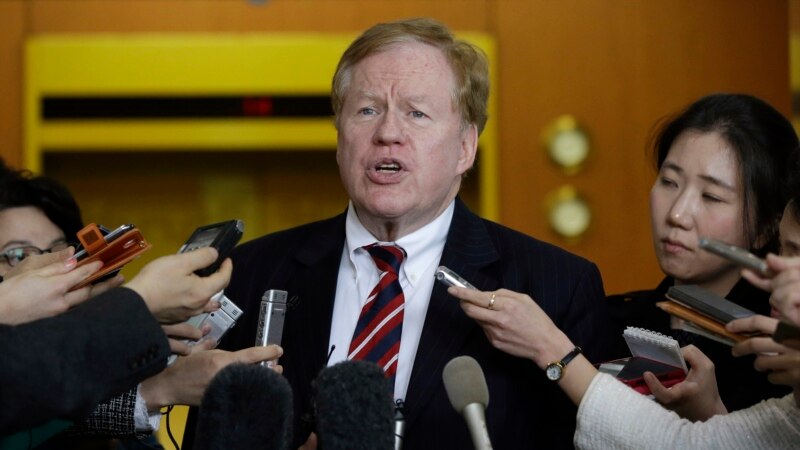Former US Envoy for N. Korea Calls for Selective Travel Ban

President Barack Obama's special envoy for North Korea human rights issues is calling for a selective travel ban after the death of a 22-year-old American college student held by the Kim Jong Un regime.
“If we do impose some kind of travel ban, it should be a selective travel ban,†Robert King, the U.S. State Department official in charge of the cases of Americans detained by North Korea, told VOA's Korean service.
King, who was involved in securing the release of American detainees in North Korea during his seven years in the job, said he supported a travel ban that restricted all recreational travel to the communist country but allowed those made for humanitarian activities.
“People ought not to be going there for tourism. To run in the Pyongyang marathon? No â€" people shouldn't be doing that,†King said. "On the other hand, for people who are involved in humanitarian efforts â€" for example, medical assistance to North Korea for multidrug-resistant tuberculosis â€" there would probably some merit in terms of having that happen.â€
Travel advisory updated
In its recently updated travel advisory, the State Department “strongly warns†U.S. citizens not to travel to North Korea because of the “serious risk of arrest and long-term detention under North Korea's system of law enforcement.†By one estimate, as many as 1,000 U.S. nationals make their way to North Korea annually.
King's comments came after the death of Otto Warmbier, a University of Virginia student from Ohio who had been detained in North Korea for more than a year. He died June 19, days after returning to Ohio in a coma. It remains unclear what happened in North Korea that led to his death. He was detained for allegedly stealing a propaganda poster from a hotel in January 2016.
After Warmbier's death, Senate Foreign Relations Chairman Bob Corker, a Tennessee Republican, told VOA: “There's no question we shouldn't have people on a willy-nilly basis going to North Korea. We should have a travel ban, and we're working on legislation right now. … We've got three Americans [detained] there now. It ends up affecting our own national security.â€
Requests either ignored or denied
Warmbier's death would “not necessarily be something that the North Koreans wanted,†said King, citing the cases of missionary Kenneth Bae, businessman Eddie Yong Su Jun and Korean War veteran Merrill Newman, all of whom were released physically unharmed.
“I think they would be unhappy to have an American die while he was in their custody,†King said. “They have tended to be fairly tough on interrogating American prisoners, but they have not, for the most part, used physical violence against Americans when they've been interrogating them.†But they are still at fault for what happened with Warmbier, King added.
King said that while he was in office, the State Department made a number of requests for access to Warmbier, but North Korea either ignored or denied them because he had violated the law.
When asked whether Pyongyang had notified Washington of the detained student's medical condition, King said, “They did not. Not that I was aware of when I was in the State Department.†King left office in mid-January.
“The fact that the Swedes were not allowed to see Warmbier after his trial may suggest that they didn't want the Swedes to [see] what condition he was in,†King said. “And that may also be one of the reasons why they've denied the Swedes access to the other three Americans that are being held there.â€
No diplomatic relations
Because the U.S. and North Korea do not maintain diplomatic relations, the Swedish Embassy in Pyongyang acts on behalf of the U.S., assuming consular responsibility for American citizens there.
North Korea, which has detained at least 16 U.S. citizens in the past 10 years, is now known to have three Americans in custody. Missionary Kim Dong Chul was detained in 2015 on espionage charges. Kim Sang Duk and Kim Hak-song were arrested in the last three months on charges of “hostile acts†against the state, while working for North Korea's only private university, Pyongyang University of Science and Technology.
“The individuals involved [in humanitarian activities in North Korea] are obviously going to have to make a decision in terms of whether it is secure for them to be there,†King said.
Change the target
Responding to President Donald Trump's charge that Warmbier should have been “brought home sooner,†an apparent dig at the Obama administration, King said, “This idea that it took Trump coming in to the White House to make a difference is ridiculous. Before Warmbier's return to U.S., Joseph Yun, the current State Department's special envoy on North Korea, reportedly met with a North Korean Foreign Ministry official in Oslo in early May, where he pushed for the release of all Americans detained in the country.
“The problem is whether the North Koreans are willing to talk to us or whether they are willing to do anything about American citizens being held there,†King said. “Maybe because the Trump administration was a new administration, there was a willingness on the part of the North Koreans to talk to Americans, which they hadn't been during the last part of the Obama administration.â€
While continuing to press Pyongyang on its human rights record is crucial, King suggested that Washington target the North Koreans who are committing human rights violations, rather than looking at sanctioning Kim Jong Un, which, he suggested is probably “not productive†even though Kim “is responsible for everything that happens in North Korea.â€
“We need to try to identify the people that are really the ones that are doing it,†King said. “In some cases, it's a question of talking with people who've left North Korea, who had some of these horrible experiences with North Korean abuse and give the information as to who the individuals are.â€
Jenny Lee contributed to this report.

0 Response to "Former US Envoy for N. Korea Calls for Selective Travel Ban"
Posting Komentar